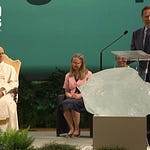We Start at the End
Exit music for this conversation is brought to us by Glass Animals, which seemed appropriate for a baking mid-June weekend when discussing burning questions about climate change - and what is to be done?1
Climate Week
London Climate Action Week is kicking off and we’ll be moderating a few events around town - we’d love to see you.
On Tuesday, 24th, I’ll be moderating some invite-only events for friends-of-the-show Climate Impact at a secret location.
And in the afternoon we’ll record an episode in front of a live audience at Ladbroke Hall, where Extreme International is hosting their Extreme Hangout. Come check out all the great shows there! Headlining our guests will be returning champion Charles Perry!
On 25th June at Reset Connect, I’ll be chairing a panel discussion about the Valley of Death, and what’s changed for climate tech entrepreneurs trying to get the growth capital to scale and what investors are looking for now.
Climate Politics When It’s Too Late
In 2024, Wim Carton and Andreas Malm released Overshoot - How the World Surrendered to Climate Breakdown. It was praised and critiqued in various quarters - but we included it in our books of the year because it’s a) beautifully written - with plenty of lateral-thought LOLs and b) was perfectly timed to come out just as the data was increasingly at odds with the “Keep 1.5 Alive” stuff of “incantatory governance” - the magical thinking that seems to be a really complicated way of avoiding some obvious, but difficult, choices. But Overshoot was just the first half of a 2-parter.
In the final part, out in October, The Long Heat - Climate Politics When It’s Too Late, Carton and Malm take up the challenge about what to do about it. Will adaptation, carbon dioxide removals, and geoengineering be topics seriously engaged with? Or will they just be a new version of finding ways to avoid the fossil fuels “stranded assets” conversation we’ve avoided having for 35 years of climate politics?
In this conversation, we spend a lot of time talking about carbon dioxide removal (CDR) technologies, revealing their roots in extending fossil fuel use, and argues for the necessity of political change to make meaningful progress.
But we ended up in an unexpected place. The book, surprisingly to me when I read it, concludes (however reluctantly) that CDR is going to be necessary. But that it needs to be decoupled from a system full of perverse incentives and moral hazard on meth and towards a re-framing of CDR as a public good.
What’s in the Conversation
00:00 Introduction and Opening Remarks
00:17 Host Introduction and Upcoming Events
02:27 Guest Introduction: Wim Carton
04:48 Discussing 'Overshoot' and Climate Politics
06:13 The Role of Fossil Fuel Companies
16:38 Adaptation Strategies and Challenges
18:43 Technological Solutions and Their Limits
20:07 Carbon Dioxide Removal (CDR)
20:51 The Concept of Negative Magic
21:41 Problematizing Reversibility
22:43 Political Economy of Carbon Dioxide Removal
24:08 Klaus Lachner and Carbon Removal
28:05 Startups and the Political Economy
31:07 Challenges in Carbon Removal Market
35:36 The Role of the State in Carbon Removal
40:12 Concluding Thoughts and Future Discussions
All the Exit Music
Get the Books
Like the authors we’re speaking with? Want to get their books, support the author, independent booksellers, and this show?
Come get em at our Bookshop.org shop!
Next episode out very soon is with Solitaire Townsend - talking about her debut novel - a cli-fi/alt-history/Roman-Empire mashup - Godstorm. What if Rome invented the combustion engine, so it never fell?
With apologies to V.I. Lenin.













